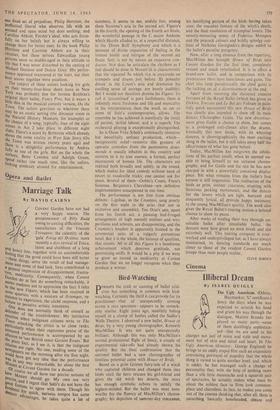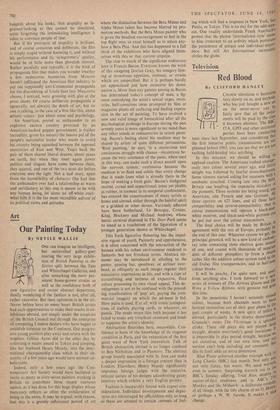Cinema
Illiberal Dream
By ISABEL QU1GLY The Ugly American. (Odeon,
Haymarket; 'LP certificate.) SINCE the days when he was expected to scratch his head and grunt his way through the dialogue, Marlon Brando has played so many parts—some of them dazzlingly sophistica- ted—that we are used to his changes not just' of voice and style and move- ment but of skin and mind and heart. In The Ugly American (director: George Englund) he brings to an oddly stupid film such an exquisitely convincing portrayal of stupidity that the whole thing is raised to quite another level; and, which is odder, he has managed such a change of personality that, with the help of nothing more than a vile little moustache and a squarish pair of spectacles, he actually makes what must be about the noblest face in films look common- place and charmless. In fact, he makes you come out of the cinema thinking that, after all, there is something basically boneheaded, obtuse and
lumpish about his looks, that stupidity as in- grained-looking as this cannot be simulated, quite forgetting the intimidating intelligence it takes to convince people of that.
But if his portrayal of stupidity is brilliant, and of course conscious and deliberate, the film is simply stupid without knowing it, and without his performance and its 'symptomatic' quality, would be of little more than ghoulish interest. Rather painfully and typically, it is the kind of propaganda film that makes you wonder whether a few undercover humorists from Moscow haven't infiltrated the American film industry to put out supposedly anti-Communist propaganda for the discrediting of Uncle Sam (my Muscovite chums, I noticed, were grinning with glee at the press show). Of course deliberate propaganda is (generally, not always) the death of art, but no one is talking, in the case of a film like this, about artistic values: just about sense and psychology.
An American, posted as ambassador to an explosive eastern country governed by an American-backed puppet government, is (rather incredibly, given his nature) the bosom pal of the people's nationalist leader who wants to avoid his country being squashed between the opposed enormities of East and West. Years back the pair of them shared liberal dreams about peace on earth, but when they meet again power politics and slogans have come between them, they quarrel, and one of the two must die before everyone sees the light. Not a bad story, apart from the incredibility of character (the fact that the ambassador ever had a relationship as warm and satisfactory as this one is meant to be with any human being, let alone an off-white one): what kills it is the far more incredible naiveté of its political views and attitudes.



































 Previous page
Previous page